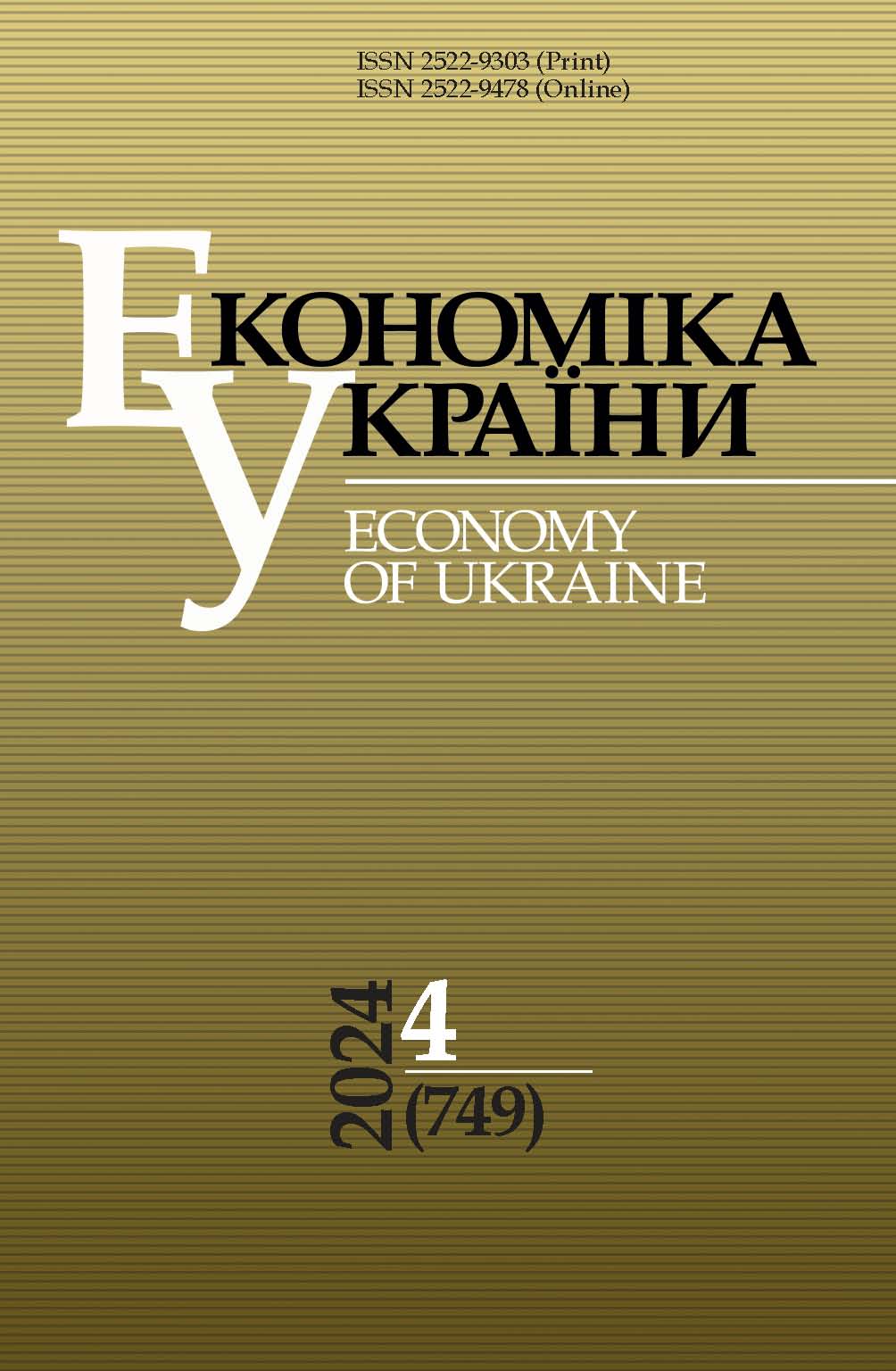FEATURES OF THE SOCIAL QUALITY OF LIFE IN UKRAINE DURING WARTIME AND THE TASK OF ITS POST-WAR IMPROVEMENT
DOI:
https://doi.org/10.15407/economyukr.2024.04.003Keywords:
state; society; socio-economic security; management models; industrial democracy; production democracy; social cohesion; justiceAbstract
It is revealed how in the context of ensuring the processes of economic power democratization, the problem of social quality of life not only as a certain standard, but also as an institutional characteristic of a social subject that is socialized in the logical and historical context of socialization processes becomes relevant.
The socio-dimensional context of "friendly relations" development through the use of production democracy tools in the European Union countries is characterized, the importance of these processes for Ukraine, which aspires to join the EU, is revealed. "Production democracy" is viewed as having the character of social dialogue, which reaches the national level, and therefore social interaction and social cooperation between the state, employers and employees yield results at the level of an individual country’s society in terms of promoting the development of the economy as a whole. It is shown that the social factor, along with the production function of productive work and the social function of activities, forms the productive function of social interaction, since the development of both individual businesses and the economy as a whole is also achieved thanks to social cooperation (interaction).
It is substantiated that the effect of action arises as a result of social interaction, that is, social interaction is a social designer of action, since the mass "production democracy" thanks to the democratization of economic power becomes one of the successful forms of social development of business and society as a whole.
Along with welfare state model, a model of social interaction of the state, business and population using the social pillars of society is being developed based on the ideology of "participatory society". It is shown – drawing on the experience of certain countries, such as Great Britain and Japan – how to form in Ukraine, by effectively involving the social pillars of society and their institutions, a successful model of post-war recovery and economic development based on the political and economic model of solidarity of the main partners, on the principles of consensus between government, business and population in order to build a highly effective post-war recovery model.
References
Mill, J. (1848). Principles of Political Economy with Some of Their Applications to Social Philosophy. Books I-II. University of Toronto Press. URL: http://digamoo.free.fr/mill1848-1.pdf
Mauro, P. (2022). Adding ethics to public finance. Evolutionary moral psychologists point the way to garnering broader support for fiscal policies. Finance & Development. Vol. 59. No. 1. P. 46-49. URL: https://www.elibrary.imf.org/view/journals/022/0059/001/article-A015-en.xml
Commons, J. (1950). The Economics of Collective Action. New York, Macmillan Company. xii, 414 p.
Tugan-Baranovsky, M. (1903). Essays on the contemporary history of political economy. 464 p. [in Russian].
Proudhon, P. (1841). Qu'est-ce que la propriété? Paris.
Berle, A., Means, G. (1932). The Modern Corporation and Private Property. Macmillan, New York. 380 p.
Heyets, V. (2023). Features of socialization and its structural transformation in Ukraine under Russia’s aggression in Ukraine. Ukrainian Society. No. 3 (86). Р. 9-25. https://doi.org/10.15407/socium2023.03.009
Marx, K., Engels, F. (1960). Complete Works. 2nd ed. Vol. 23. [in Russian].
Galligan, D. (2006). Social Spheres. In: Law in Modern Society. Clarendon Law Series. Oxford Academic. Ch. 6. Р. 103-120. https://doi.org/10.1093/acprof:oso/9780199291830.003.0007
Shedyakov, V. (2018). Improving of industrial democracy – main direction of development of organizational and managerial relations. Odesa National University Herald. Economy. Vol. 23. No. 1. P. 7-11. URL: http://nbuv.gov.ua/UJRN/Vonu_econ_2018_23_1_3 [in Russian].
Balakireva, O., Dmytruk, D. (2020). Trends in civic engagement and the trust level in Ukraine. Ukrainian Society. No. 1(72). P. 162-185. https://doi.org/10.15407/socium2020.01.162 [in Ukrainian].
Pankova, O., Kasperovych, O., Ishchenko, O. (2016). The development of volunteer activity in Ukraine as a demonstration of civil society social resources activation: specificity, problems and perspectives. Ukrainian Society. No. 2(57). P. 25-40. https://doi.org/10.15407/socium2016.02.025 [in Ukrainian].
Johnson, Ch. (2022). MITI and the Japanese Miracle. The Growth of Industrial Policy, 1925-1975. R. Klochko (transl.). Kyiv. 456 p. [in Ukrainian].
Saburo, Okita (1992). Post-War Reconstruction of the Japanese Economy. University of Tokyo Press. 194 p.
Hayes, С. (2012). Twilight of the Elites: America After Meritocracy. Crown Publishers, 304 p.
Bell, D. (1999). The Coming of Post-Industrial Society: A Venture in Social Forecasting. V. Inozemtsev (Ed.). 327 p. [in Russian].
Young, М. (1958). The Rise of the Meritocracy. 198 р. https://doi.org/10.2307/4610054
Popper, K. (1962). The Open Society and Its Enemies. Vol. 1: The Age of Plato. 364 р.
Downloads
Published
How to Cite
Issue
Section
License
Copyright (c) 2024 Publisher PH "Academperiodyka" of the NAS of Ukraine

This work is licensed under a Creative Commons Attribution-NonCommercial-NoDerivatives 4.0 International License.



